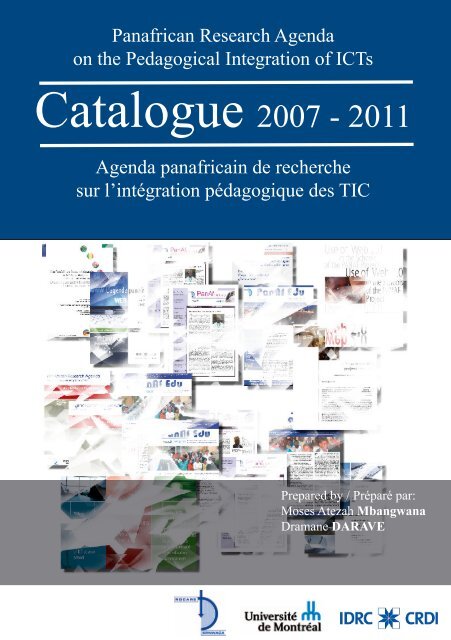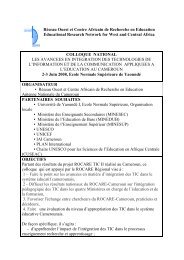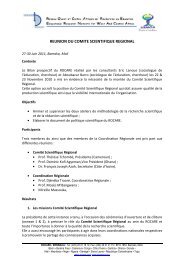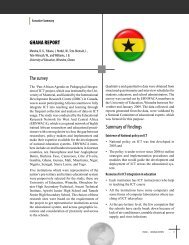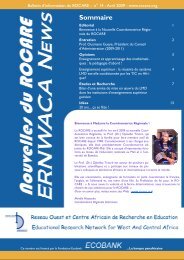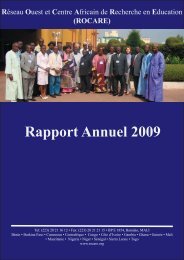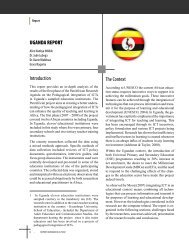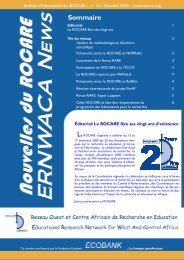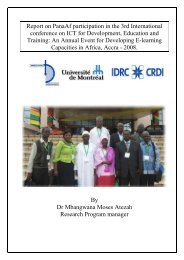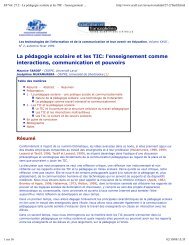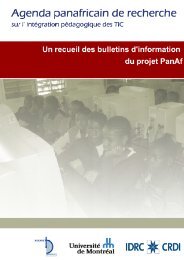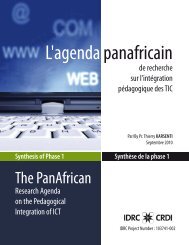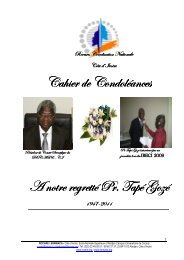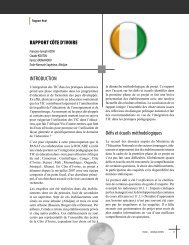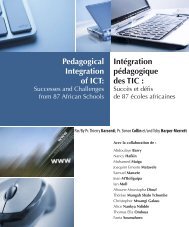The PanAf Publications Catalogue / Le catalogue des publications ...
The PanAf Publications Catalogue / Le catalogue des publications ...
The PanAf Publications Catalogue / Le catalogue des publications ...
- No tags were found...
Create successful ePaper yourself
Turn your PDF publications into a flip-book with our unique Google optimized e-Paper software.
Panafrican Research Agenda<br />
on the Pedagogical Integration of ICTs<br />
<strong>Catalogue</strong> 2007 - 2011<br />
Agenda panafricain de recherche<br />
sur l’intégration pédagogique <strong>des</strong> TIC<br />
Prepared by / Préparé par:<br />
Moses Atezah Mbangwana<br />
Dramane DARAVE
<strong>The</strong> <strong>publications</strong> listed in this document have been produced as outputs of the Panafrican<br />
Research Agenda on the Pedagogical Integration of ICT Project , funded by the<br />
International Development Research Centre (IDRC, www.idrc.ca) and implemented by<br />
the Educational Research Network for West and Central Africa (ERNWACA, www.<br />
ernwaca.org), in collaboration with the University of Montreal.<br />
For more information, please contact us at :<br />
Educational Research Network for West and Central Africa (ERNWACA)<br />
Regional Coordination<br />
BP : E 1854<br />
Bamako, Mali<br />
E-mail: panaf@rocare.org<br />
<strong>Le</strong>s <strong>publications</strong> répertoriées dans ce document ont été réalisées dans le cadre du<br />
projet Agenda panafricain de recherche sur l’intégration pédagogique <strong>des</strong> TIC, financé<br />
par le Centre de recherche pour le développement international (CRDI, www.crdi.ca)<br />
et exécuté par le Réseau ouest et centre africain de recherche en éducation (ROCARE,<br />
www.rocare.org), en collaboration avec l’Université de Montréal.<br />
Pour plus d’informations, veuillez nous contacter à l’adresse suivante:<br />
Réseau Ouest et Centre Africain de Recherche en Education (ROCARE)<br />
Coordination régionale<br />
BP : E 1854<br />
Bamako, Mali<br />
E-mail: panaf@rocare.org<br />
© October / Octobre 2011
Table of contents<br />
Table <strong>des</strong> matières<br />
Pages<br />
Introduction 4 - 5<br />
<strong>PanAf</strong> phase 1 National Reports 5<br />
Synthesis of phase I / Synthèse de la phase I 7<br />
Pedagogical Integration of ICT: Successes and Challenges 9<br />
from 87 African Schools<br />
Brief Guide: Introduction to the Observatory on ICTs in 10<br />
Education<br />
<strong>PanAf</strong> Edu Vol. 2, n°1 11<br />
<strong>PanAf</strong> Edu Vol. 2, n°2 12<br />
<strong>PanAf</strong> Edu Vol. 2, n°3 13<br />
<strong>PanAf</strong> Edu Vol. 2, n°4 14<br />
<strong>PanAf</strong> Edu vol. 1, n°1 15<br />
<strong>PanAf</strong> Edu vol.1 , n°2 16<br />
<strong>PanAf</strong> Edu vol. 1, n°3 17<br />
<strong>PanAf</strong> Edu vol. 1, n°4 18<br />
A collection of <strong>PanAf</strong> Edu project’s newsletters / Un recueil 19<br />
<strong>des</strong> bulletins d’information du projet <strong>PanAf</strong><br />
Diary of schools visits / Carnet de visites d’écoles 20<br />
<strong>The</strong> Hole in the Wall project revisited 21<br />
Use of Web 2.0 in the Schools of the <strong>PanAf</strong> project 22<br />
<strong>PanAf</strong> Recommendations / Récommendations <strong>PanAf</strong> 23 - 24
<strong>PanAf</strong>rican Research Agenda<br />
on the Pedagogical Integration of ICTs<br />
Introduction<br />
This document is a compilation of <strong>publications</strong> produced by the<br />
management team of the <strong>PanAf</strong> Project over the period 2007-<br />
2011. <strong>The</strong>se <strong>publications</strong> include reports, books, newsletters<br />
and pamphlets.<br />
With Phase 1 (2007-2009), the <strong>PanAf</strong> network succeeded both in collecting<br />
an unprecedented depth of data on ICTs in African schools, and<br />
in developing exceptional international partnerships with the World Bank<br />
and UNESCO. <strong>The</strong> schools <strong>des</strong>cribed in the Phase 1 research represent<br />
nearly 245 000 learners and 9000 educators, and paint a never-beforeseen<br />
portrait of the pedagogical integration of ICTs across Africa.<br />
Substantive analysis of this new knowledge remains, in order to draw<br />
out empirically supported conclusions and recommendations. Improvement<br />
in education outcomes, through policy decision‐making and<br />
teacher‐training, must stand on a solid empirical base of evidence – data<br />
rigorously and meticulously collected and analyzed. After collecting an<br />
exceptional quantity and quality of data in Phase 1, <strong>PanAf</strong> Phase 2 will<br />
provide such an opportunity for African researchers to formulate these<br />
recommendations for policy and practice.<br />
Enjoy reading<br />
4<br />
<strong>Catalogue</strong> of <strong>Publications</strong><br />
2007 - 2011
Agenda panafricain de recherche<br />
sur l’intégration pédagogique <strong>des</strong> TIC<br />
Introduction<br />
Ce document est un recueil <strong>des</strong> <strong>publications</strong> réalisées par<br />
l’équipe de gestion du projet <strong>PanAf</strong> sur la période 2007-2011.<br />
Ces <strong>publications</strong> se répartissent en rapports, livres, bulletin<br />
d’informations et dépliants.<br />
La phase 1 (2007-2009) a permis au réseau <strong>PanAf</strong>, d’une part, de réunir<br />
<strong>des</strong> données d’une ampleur inédite sur les TIC dans les écoles africaines<br />
et, d’autre part, à développer <strong>des</strong> partenariats internationaux exceptionnels<br />
avec la Banque mondiale et l’UNESCO. <strong>Le</strong>s écoles décrites<br />
dans la recherche de la phase 1 représentent près de 245 000 apprenants<br />
et 9 000 enseignants, et dressent un portrait jusqu’ici inexistant de<br />
l’intégration pédagogique <strong>des</strong> TIC dans l’ensemble <strong>des</strong> pays africains.<br />
L’analyse substantielle de ce nouveau savoir doit se poursuivre afin<br />
de parvenir à <strong>des</strong> conclusions et à <strong>des</strong> recommandations soutenues empiriquement.<br />
L’amélioration <strong>des</strong> résultats scolaires, par la prise de décisions<br />
stratégiques et la formation du personnel enseignant, doit reposer<br />
sur un fondement empirique solide – sur <strong>des</strong> données rigoureusement et<br />
minutieusement recueillies et analysées. Suivant la cueillette de données<br />
d’une quantité et d’une qualité exceptionnelles de la phase 1, la phase 2<br />
du projet <strong>PanAf</strong> permettra aux chercheurs africains de formuler de telles<br />
recommandations en matière de politiques et de pratique.<br />
Bonne lecture<br />
<strong>Catalogue</strong> <strong>des</strong> <strong>publications</strong><br />
2007 - 2011<br />
5
<strong>PanAf</strong>rican Research Agenda<br />
on the Pedagogical Integration of ICTs<br />
<strong>PanAf</strong> phase 1 National<br />
Reports<br />
“This compilation of research<br />
reports by the<br />
national teams participating<br />
in the <strong>PanAf</strong> project<br />
present the major themes emerging<br />
from the analysis of the ambitious<br />
volume of data collected during<br />
Phase 1 of the <strong>PanAf</strong>rican Research<br />
Agenda on the Pedagogical<br />
Integration of ICTs. As a matter of<br />
introduction, we will first focus<br />
on presenting a synthesis of some<br />
results specifically related to the<br />
pedagogical integration of ICTs.<br />
Afterward, the twelve reports are<br />
presented.<br />
Analysis of the data collected<br />
by the 12 national research teams<br />
reveals a multitude of uses of ICTs<br />
in the nearly 120 African schools participating in the project. <strong>The</strong>se<br />
uses vary from initiation of learners to the fundamentals of computing,<br />
to the creation of elaborate projects involving learner-created websites,<br />
videos, field research and experimentation content. <strong>The</strong> types of ICTs<br />
uses found in <strong>PanAf</strong> Phase 1 data can be grouped as follows:<br />
1. Use as the subject of learning;<br />
2. Use as the means of learning;<br />
3. Other uses.” - Thierry Karsenti, Directeur du projet <strong>PanAf</strong><br />
Link / Lien : www.ernwaca.org/panaf/pdf/phase-1/<strong>PanAf</strong>_Report.pdf<br />
6<br />
<strong>Catalogue</strong> of <strong>Publications</strong><br />
2007 - 2011
Synthesis of phase I /<br />
Synthèse de la phase I<br />
<strong>Catalogue</strong> <strong>des</strong> <strong>publications</strong><br />
2007 - 2011<br />
Agenda panafricain de recherche<br />
sur l’intégration pédagogique <strong>des</strong> TIC<br />
“Ce rapport synthèse sur<br />
portant sur la Phase I du<br />
projet <strong>PanAf</strong> présente<br />
d’abord une synthèse globale<br />
du projet (Section I), il dresse<br />
la liste <strong>des</strong> partenaires, chercheurs,<br />
coordination, comité<br />
scientifique, etc. (Section II). Il<br />
propose ensuite une synthèse de<br />
la problématique de recherche<br />
sous-jacente à la mise en place<br />
d’un tel projet (Section III). <strong>Le</strong>s<br />
questions et objectifs de recherche<br />
pour la Phase I sont ensuite<br />
présentés (Section IV). Ils sont<br />
suivi de la Méthodologie de recherche<br />
novatrice qui a été mise<br />
de l’avant pour le projet <strong>PanAf</strong><br />
(Section V).<br />
L’Observatoire sur l’intégration pédagogique <strong>des</strong> TIC, une <strong>des</strong> réalisations<br />
majeures de la Phase I du projet <strong>PanAf</strong> est par la suite succinctement<br />
esquissée (Section VI). Étant donné l’importance accordée au genre<br />
dans le projet <strong>PanAf</strong>, la Section VII est consacrée à cette question. À la<br />
Section VIII, on retrouve les principales activités réalisées au cours de la<br />
Phase I. On retrouve ensuite une présentation <strong>des</strong> principales réalisations<br />
(outputs) du projet (Section IX).<br />
Enfin, à la section X, on retrouve une présentation minutieuse et détaillée<br />
de la synthèse <strong>des</strong> résultats de recherche spécifiques à chacun <strong>des</strong><br />
pays, en fonction <strong>des</strong> rapports nationaux produits justement par les chercheurs<br />
de ces pays. La Section XI se veut une synthèse générale, presque<br />
sous forme de recommandations, sur les types d’intégration pédagogique<br />
7
<strong>PanAf</strong>rican Research Agenda<br />
on the Pedagogical Integration of ICTs<br />
<strong>des</strong> TIC retrouvés dans les quelque 117 écoles du projet <strong>PanAf</strong>. Afin de<br />
montrer que ce projet était – et est toujours – solidement ancré dans la<br />
littérature scientifique internationale, la Section XII présente un aperçu<br />
<strong>des</strong> principaux éléments théoriques sous-jacents à ce projet : Pourquoi un<br />
tel projet en Afrique (12.1); Qu’est-ce que l’intégration pédagogique<br />
<strong>des</strong> TIC (12.2); Que sait-on <strong>des</strong> usages <strong>des</strong> TIC dans divers contextes<br />
éducatifs en Afrique (12.3); Du fossé technologique au fossé technopédagogique<br />
(12.4); L’importance <strong>des</strong> TIC en Afrique (12.5); Quels sont les<br />
défis inhérents à l’intégration pédagogique <strong>des</strong> TIC dans les pays du<br />
Nord (12.6); Quels sont les défis inhérents à l’intégration pédagogique<br />
<strong>des</strong> TIC dans les pays du Sud (12.7); L’importance de réaliser <strong>des</strong> recherches<br />
panafricaines sur l’intégration pédagogique <strong>des</strong> TIC (12.8). Enfin<br />
une liste <strong>des</strong> écoles participant au projet <strong>PanAf</strong> est présentée en annexe,<br />
pour chacun <strong>des</strong> pays.” - Thierry Karsenti, Directeur du projet <strong>PanAf</strong><br />
Link / Lien : www.ernwaca.org/panaf/IMG/pdf/<strong>PanAf</strong>-Rapportsynthese.pdf<br />
8<br />
<strong>Catalogue</strong> of <strong>Publications</strong><br />
2007 - 2011
Agenda panafricain de recherche<br />
sur l’intégration pédagogique <strong>des</strong> TIC<br />
Pedagogical Integration<br />
of ICT: Successes and<br />
Challenges from 87 African<br />
Schools<br />
Intégration pédagogique <strong>des</strong> TIC : Succès et défis de 87 écoles<br />
africaines<br />
“We emphasize the important<br />
role of the Observatory for<br />
education transformation in<br />
Africa. We reiterate the significant<br />
contributions of the researchers, and<br />
their commitment to provide clearly<br />
written and relevant data that can<br />
be shared with others to assist in<br />
policy-making and to guide further<br />
comparative research. At present,<br />
the Observatory is useful to a limited<br />
amount of people. Strategies for<br />
wide-range promotion of the project<br />
towards others who are not part of<br />
ERNWACA or <strong>PanAf</strong> are important<br />
for increased use and sharing<br />
of the data. <strong>The</strong> clarity of navigating<br />
instruction on the Observatory<br />
is very encouraging. We conclude by<br />
soliciting researchers to demonstrate integrative thinking, and to be aware that<br />
their work opens up many doors for collaborative action research.”<br />
- Thierry<br />
Karsenti, Director of the <strong>PanAf</strong> Project<br />
Link/ Lien: www.ernwaca.org/panaf/IMG/pdf/<strong>PanAf</strong>-Success-andchallenges-african-schools.pdf<br />
<strong>Catalogue</strong> <strong>des</strong> <strong>publications</strong><br />
2007 - 2011<br />
9
<strong>PanAf</strong>rican Research Agenda<br />
on the Pedagogical Integration of ICTs<br />
Brief Guide: Introduction to<br />
the Observatory on ICTs in<br />
Education<br />
“This document is <strong>des</strong>igned<br />
to aid users in<br />
navigating the Observatory<br />
- an innovative and<br />
dynamic tool which provi<strong>des</strong><br />
researchers and practitioners<br />
with greatly enhanced access to<br />
African ICT in education data.”<br />
- Thierry Karsenti, Directeur<br />
du projet <strong>PanAf</strong><br />
Link / Lien: www.<br />
thierrykarsenti.ca/pdf/scholar/<br />
RAP-karsenti-66.2006.pdf<br />
10<br />
<strong>Catalogue</strong> of <strong>Publications</strong><br />
2007 - 2011
<strong>PanAf</strong> Edu Vol. 2, n°1<br />
Agenda panafricain de recherche<br />
sur l’intégration pédagogique <strong>des</strong> TIC<br />
“Discussion of the use<br />
of ICTs in Africa is often<br />
dominated by issues<br />
of access. <strong>The</strong> reality is that access<br />
to computers and the Internet<br />
will be variable depending on<br />
the socio-economic backgrounds<br />
and location of various institutions<br />
and the data demonstrates<br />
this. Castells (2001) observes that<br />
“the double logic of inclusion and<br />
exclusion cuts across countries”<br />
denoting the dominant and the<br />
dominated or those integrated or<br />
disintegrated into global and local<br />
societies respectively.” - Mandi<br />
Maodzwa-Taruvinga, School of<br />
Education, University of the Witwatersrand<br />
Link : www.ernwaca.org/panaf/IMG/pdf/<strong>PanAf</strong>%20Edu_v2n1_EN.pdf<br />
Lien: www.ernwaca.org/panaf/IMG/pdf/<strong>PanAf</strong>%20Edu_v2n1_FR.pdf<br />
<strong>Catalogue</strong> <strong>des</strong> <strong>publications</strong><br />
2007 - 2011<br />
11
<strong>PanAf</strong>rican Research Agenda<br />
on the Pedagogical Integration of ICTs<br />
<strong>PanAf</strong> Edu Vol. 2, n°2<br />
“<br />
<strong>Le</strong> Cameroun, avec ses millions<br />
d’écoliers, de lycéens<br />
et près de trois cent mille étudiants,<br />
a mis sur pied une stratégie<br />
susceptible d’étendre de nouveaux<br />
mo<strong>des</strong> d’enseignement<br />
par les TIC, en présentiel ou<br />
à distance. Si l’École normale<br />
supérieure de Yaoundé a ouvert<br />
depuis longtemps une filière de<br />
l’enseignement <strong>des</strong> et par les TIC,<br />
l’informatique est généralisée dans<br />
les écoles primaires et <strong>des</strong> gui<strong>des</strong><br />
pédagogiques sont disponibles<br />
aussi bien pour l’utilisation <strong>des</strong><br />
TIC que pour les ordinateurs XO<br />
dont 4000 <strong>des</strong> 9 000 exemplaires<br />
sont acquis et déjà en service<br />
dans une cinquantaine d’écoles.”<br />
- Louis Martin ONGUENE ESSONO, Université de Yaoundé 1, Cameroun<br />
Link / Lien : www.ernwaca.org/panaf/IMG/pdf/<strong>PanAf</strong>Edu_v2_n2.pdf<br />
12<br />
<strong>Catalogue</strong> of <strong>Publications</strong><br />
2007 - 2011
<strong>PanAf</strong> Edu Vol. 2, n°3<br />
Agenda panafricain de recherche<br />
sur l’intégration pédagogique <strong>des</strong> TIC<br />
“<strong>The</strong>re is a persistent phobia<br />
among parents, school<br />
administrators and teachers<br />
that when girls access internet<br />
/visit cybercafés, their main<br />
intention is to surf phonographic<br />
materials – “imagined dangerous<br />
spaces” (Holin 2005). This fear<br />
has unfortunately to a great extent<br />
influenced decisions on girls’ access<br />
and use of cybercafés, mobile<br />
phones and internet installation in<br />
schools.<br />
However, analysis of emerging<br />
data collected from group discussions<br />
with female and male students<br />
of the <strong>PanAf</strong> project participating<br />
secondary schools in Uganda<br />
and Kenya indicate that Cybercafés<br />
are becoming a major point of access to the Internet as a channel for<br />
knowledge sharing, acquisition and social networking especially among<br />
students who do not have connectivity at home and are denied access to<br />
the internet at school. Female students reported two major purposes why<br />
they go to cybercafés. <strong>The</strong> first one was for social networking (keeping<br />
in touch with their friends, and making new ones especially by accessing<br />
their emails and through Facebook. Some reported that through Facebook,<br />
they have been able to meet other colleagues from across.” - Alice<br />
Nankya Ndidde, Department of Adult Education and Communication<br />
Studies, Makerere University<br />
Link / Lien: www.ernwaca.org/panaf/IMG/pdf/<strong>PanAf</strong>-Edu-vol2-n-3.pdf<br />
<strong>Catalogue</strong> <strong>des</strong> <strong>publications</strong><br />
2007 - 2011<br />
13
<strong>PanAf</strong>rican Research Agenda<br />
on the Pedagogical Integration of ICTs<br />
<strong>PanAf</strong> Edu Vol. 2, n°4<br />
“<strong>The</strong> South African data<br />
in this project disclose<br />
a trend that is not exclusive<br />
to that experienced by<br />
most African countries where,<br />
in-service teacher training is<br />
merely teaching of computer<br />
basic skills. <strong>The</strong> technological<br />
skills are taught out of context<br />
with the hope that they will<br />
somehow integrate ICTs into<br />
the curriculum that is subject<br />
specific. <strong>The</strong> technology in<br />
this case is not infused into the<br />
subjects taught but given more<br />
attention in the training and<br />
this is referred to as computer<br />
literacy. <strong>The</strong> word, ‘literate’<br />
implies having learnt, being<br />
knowledgeable and cultured.<br />
Such qualities are attained after spending some amount of time working<br />
on the gadget until using it becomes ‘a second nature’ and consequently,<br />
renders the user more productive. <strong>The</strong> training at best encompass skills<br />
in word, presentation and spreadsheet that Unwin (2004) <strong>des</strong>cribes as<br />
“tools with little or no educational value” as they are not taught in the<br />
realms of a particular field. Such initiatives are obviously driven by a<br />
lack of understanding of the potentials of ICTs in enhancing the practice<br />
of teaching and how they can change learners’ experiences.” - Sithabile<br />
Nokulunga Ndlovu, Wits School of Education, South Africa<br />
Link / Lien: www.ernwaca.org/panaf/IMG/pdf/<strong>PanAf</strong>-Edu-vol2-n-4.pdf<br />
14<br />
<strong>Catalogue</strong> of <strong>Publications</strong><br />
2007 - 2011
Agenda panafricain de recherche<br />
sur l’intégration pédagogique <strong>des</strong> TIC<br />
<strong>PanAf</strong> Edu vol. 1, n°1<br />
“Avec l’expansion continue<br />
<strong>des</strong> technologies<br />
de l’information et de la<br />
communication (TIC) sur le continent<br />
africain, l’éducation a été<br />
l’un <strong>des</strong> secteurs où les usages<br />
se sont rapidement développés<br />
grâce aux énormes efforts consentis<br />
en matière d’équipements<br />
informatiques et de connectivité<br />
<strong>des</strong> écoles. Cependant, il reste<br />
que ces usages ne vont pas, dans<br />
la plupart <strong>des</strong> cas, au-delà de<br />
l’alphabétisation numérique (initiation<br />
aux logiciels courants) et<br />
aux recherches documentaires<br />
effectuées par les élèves et les<br />
enseignants. Même si, avec de<br />
tels usages, <strong>des</strong> avancées ont été<br />
notées dans les pratiques d’apprentissage et d’enseignement du fait <strong>des</strong><br />
TIC, la question de leur intégration effective et réussie dans les curricula<br />
demeure marginale. C’est pour tenir compte de cette donne que<br />
le programme Acacia du Centre de recherches pour le développement<br />
international (CRDI) a accordé, dans sa programmation en cours (2006-<br />
2011), une place de choix à une thématique de recherche axée sur les<br />
nouveaux contextes d’apprentissage induits par les TIC et les métho<strong>des</strong><br />
pédagogiques novatrices qui doivent en découler.” - Alioune Camara,<br />
Chargé principal de programme, CRDI, Sénégal<br />
Lien : www.ernwaca.org/panaf/IMG/pdf/panaf-newsletter-FR.pdf<br />
Link : www.ernwaca.org/panaf/IMG/pdf/panaf-newsletter-EN.pdf<br />
<strong>Catalogue</strong> <strong>des</strong> <strong>publications</strong><br />
2007 - 2011<br />
15
<strong>PanAf</strong>rican Research Agenda<br />
on the Pedagogical Integration of ICTs<br />
<strong>PanAf</strong> Edu vol.1 , n°2<br />
“Technology will not reduce<br />
divi<strong>des</strong> between<br />
haves and have nots, between<br />
urban and rural folk, between<br />
men and women. Social<br />
decisions and actions bridge. As<br />
researchers from South Africa<br />
so aptly pointed out at a <strong>PanAf</strong><br />
methodology workshop in Nairobi<br />
last September, based on<br />
2006 statistics, it is “still the<br />
case in South Africa at large<br />
that the vast majority of schools<br />
simply do not yet use ICTs in<br />
any way whatsoever. Perhaps<br />
most alarmingly, the 2006 statistics<br />
seem to indicate that not<br />
much progress has been made in<br />
regard to such provision in poorer schools over the past five years” (Ian<br />
Moll, 2007).<br />
ICT will not magically provide educational quality and equality. We<br />
must do that, together.” - Kathryn Touré, Former ERNWACA Regional<br />
Coordinator<br />
Link: www.ernwaca.org/panaf/IMG/pdf/<strong>PanAf</strong>_edu_2_EN.pdf<br />
16<br />
<strong>Catalogue</strong> of <strong>Publications</strong><br />
2007 - 2011
<strong>PanAf</strong> Edu vol. 1, n°3<br />
Agenda panafricain de recherche<br />
sur l’intégration pédagogique <strong>des</strong> TIC<br />
<strong>The</strong> importance of gender<br />
analysis of ICT data<br />
“<strong>The</strong> <strong>PanAf</strong> Observatory<br />
is to be congratulated for<br />
its commitment to the<br />
collection of sex-disaggregated<br />
data. If I am counting right, there<br />
are 17 data sets 1 with sex-disaggregated<br />
data. Researchers participating<br />
in this project may not<br />
be aware of the uniqueness of this<br />
because it has been part of the<br />
project from the beginning, but<br />
what they are doing by collecting<br />
sex-disaggregated data is still the<br />
rare case, much more often not<br />
done than done.<br />
<strong>The</strong> <strong>PanAf</strong> approach is very<br />
much in line with international<br />
standards being established, in<br />
particular by the Partnership on Measuring ICT for Development (www.<br />
itu.int/ITU-D/ict/partnership/).” - Nancy Hafkin, Member, ERNWACA<br />
<strong>PanAf</strong> Scientific Committee<br />
Link: www.ernwaca.org/panaf/IMG/pdf/<strong>PanAf</strong>_Edu_3_EN.pdf<br />
<strong>Catalogue</strong> <strong>des</strong> <strong>publications</strong><br />
2007 - 2011<br />
17
<strong>PanAf</strong>rican Research Agenda<br />
on the Pedagogical Integration of ICTs<br />
<strong>PanAf</strong> Edu vol. 1, n°4<br />
“Nombreuses sont les<br />
personnes qui sont<br />
d’avis aujourd’hui que<br />
la recherche et l’éducation se<br />
situent au cœur du développement<br />
économique et social et<br />
sont <strong>des</strong> préalables à l’essor<br />
technologique. En retour, la maîtrise<br />
<strong>des</strong> TIC pourrait contribuer<br />
à l’amélioration de la qualité de<br />
l’éducation. Dès lors, intégrer<br />
les TIC à l’éducation devient<br />
une voie privilégiée pouvant favoriser<br />
l’émergence d’un secteur<br />
socioéconomique de haut niveau<br />
technologique. Ainsi, l’aide à<br />
la recherche, la formation et la<br />
coopération internationale pour<br />
la maîtrise <strong>des</strong> TIC deviennent<br />
<strong>des</strong> solutions potentiellement porteuses. C’est dans cette perspective<br />
que l’on pourrait situer le projet Panaf et les recherches qui se mènent<br />
dans <strong>des</strong> écoles de plusieurs pays africains et dont les résultats sont ici<br />
présentés par quelques articles.” - Abdoulaye Barry, Membre, Comité<br />
scientifique de ROCARE <strong>PanAf</strong><br />
Lien : www.ernwaca.org/panaf/IMG/pdf/<strong>PanAf</strong>_Edu_4_FR.pdf<br />
18<br />
<strong>Catalogue</strong> of <strong>Publications</strong><br />
2007 - 2011
A collection of <strong>PanAf</strong> Edu<br />
project’s newsletters /<br />
Un recueil <strong>des</strong> bulletins<br />
d’information du projet<br />
<strong>PanAf</strong><br />
Agenda panafricain de recherche<br />
sur l’intégration pédagogique <strong>des</strong> TIC<br />
“ICT are increasingly<br />
present in African societies,<br />
and have been<br />
introduced to varying degrees<br />
at all education levels from preschool<br />
to university, and in both<br />
the formal and informal sectors.<br />
<strong>The</strong>y are also used to offer distance<br />
education to teachers and<br />
other adult learners. However,<br />
in various education systems<br />
across Africa, ICT are increasingly<br />
being taught as a completely<br />
separate discipline, while<br />
ICT integration into pedagogical<br />
practices to improve the quality<br />
of teaching and learning remains<br />
in the exploratory stage.<br />
Outside of South Africa, little African research is being conducted on<br />
the efficient use of ICT in education, though a IDRC-funded study in<br />
2004-2005 in West and Central Africa has demonstrated the potential of<br />
ICT to transform pedagogical practices.”<br />
Link : www.ernwaca.org/panaf/IMG/pdf/<strong>PanAf</strong>-Collection-EN.pdf<br />
<strong>Catalogue</strong> <strong>des</strong> <strong>publications</strong><br />
2007 - 2011<br />
19
<strong>PanAf</strong>rican Research Agenda<br />
on the Pedagogical Integration of ICTs<br />
Diary of schools visits /<br />
Carnet de visites d’écoles<br />
“Teachers have learnt to<br />
use the computer through<br />
the search of material for<br />
their lessons. As reported by one of<br />
the teachers in the centre, who was<br />
working with form two students,<br />
“…teaching is made easier with<br />
the use of ICTs.” This was evident<br />
as he was using the computers to<br />
teach a topic in Chemistry entitled<br />
the “Electronic Configuration of<br />
atoms” with about 3 or 4 students<br />
per computer.” - Lycée Bilingue<br />
Essos Yaounde (Cameroon)<br />
Link : www.ernwaca.org/panaf/<br />
IMG/pdf/<strong>PanAf</strong>-Carnet-devoyage.pdf<br />
“L’Institut dispose de 3 salles informatiques contenant 80 ordinateurs<br />
et ‘une vingtaine d’ordinateurs affectés au service administratif. En plus<br />
il propose un programme de formation en informatique à ses étudiants<br />
durant tout leur cursus. L’élève qui en manifeste le besoin, peut également<br />
prendre part à l’examen de certification validant ses aptitu<strong>des</strong> en<br />
TIC moyennant finances. <strong>Le</strong> coût de la formation par élève s’élève à<br />
60 000 frs CFA. Quant à celui de la certification, il est de 52 000 frs CFA.<br />
“ - Institut Raggi Anne Marie de Grand Bassam (Côte d’ivoire)<br />
Lien: www.ernwaca.org/panaf/IMG/pdf/<strong>PanAf</strong>-Carnet-de-voyage.pdf<br />
20<br />
<strong>Catalogue</strong> of <strong>Publications</strong><br />
2007 - 2011
Agenda panafricain de recherche<br />
sur l’intégration pédagogique <strong>des</strong> TIC<br />
<strong>The</strong> Hole in the Wall project<br />
revisited<br />
“<strong>The</strong> most recent addition<br />
to the <strong>PanAf</strong> network is a<br />
team of researchers from<br />
the School of Education, University<br />
of Zambia (UNZA). <strong>Le</strong>d by<br />
Mr. Benson NDLOVU, a lecturer<br />
at the Department of Library and<br />
Information Studies, the Zambian<br />
<strong>PanAf</strong> team has joined the initial<br />
network of five study schools to<br />
share indicators on the Observatory<br />
at www.observatoiretic.org .<br />
One of the institutions being<br />
followed is the Vera Chiluba Basic<br />
School, a public school from<br />
gra<strong>des</strong> one to nine that serves<br />
highdensity compounds in the<br />
capital city. As a demonstration of the richness brought to the <strong>PanAf</strong> data<br />
set through the use of mixed quantitative and qualitative methodologies,<br />
it is worth taking a closer look at indicators of ICT access and use in the<br />
school.<br />
By any measure, this a vastly under-resourced institution. Two shifts<br />
(morning and afternoon) of approximately 1500 learners each are taught<br />
by a staff of fewer than 60 educators. And for all these learners, only two<br />
computer terminals are available (three more are available to educators<br />
and administrators).”<br />
Link / Lien: www.ernwaca.org/panaf/IMG/pdf/Wall%20project.pdf<br />
<strong>Catalogue</strong> <strong>des</strong> <strong>publications</strong><br />
2007 - 2011<br />
21
<strong>PanAf</strong>rican Research Agenda<br />
on the Pedagogical Integration of ICTs<br />
Use of Web 2.0 in the<br />
Schools of the <strong>PanAf</strong> project<br />
“In addition to the recently-submitted<br />
interim<br />
technical report for Pan-<br />
Af Phase 2, we felt it was important<br />
to note some highlights of the<br />
network’s researchspecifically regarding<br />
‘Web 2.0’ in the sampled<br />
schools.<br />
<strong>The</strong> <strong>PanAf</strong> network is centred on<br />
an open data set made available by<br />
researchers at the partner institutions.<br />
Open access, and ‘wiki’-style updating<br />
of the indicators is intended to<br />
echo the collaborative style of ‘Web<br />
2.0’ in the project’s <strong>des</strong>ign.<br />
<strong>The</strong> complete set of data at www.<br />
observatoiretic.org currently draws<br />
from 106 primary, secondary and<br />
tertiary (teacher-training) institutions in 12 African countries. <strong>The</strong>se indicators<br />
represent over 240,000 learners…”<br />
Link / Lien: www.ernwaca.org/panaf/IMG/pdf/Web-2-In-<strong>PanAf</strong>-Schools.pdf<br />
22<br />
<strong>Catalogue</strong> of <strong>Publications</strong><br />
2007 - 2011
<strong>PanAf</strong> Recommendations<br />
Agenda panafricain de recherche<br />
sur l’intégration pédagogique <strong>des</strong> TIC<br />
<strong>The</strong> <strong>PanAf</strong> Project scientific team is proud to present its recommendations.<br />
<strong>The</strong>y were developed over three years of collaborative<br />
research on the pedagogical integration of information<br />
and communications technologies (ICT). <strong>The</strong> recommendations are presented<br />
in three separate brochures that target various stakeholders in the<br />
pedagogical integration of ICT in Africa: 1) school teachers and principals;<br />
2) policy makers, teacher trainers, and other education administrators;<br />
and 3) researchers specializing in ICT in education.<br />
For more information on the recommendations of the <strong>PanAf</strong> Project,<br />
visit: www.africaict.org<br />
<strong>Catalogue</strong> <strong>des</strong> <strong>publications</strong><br />
2007 - 2011<br />
23
<strong>PanAf</strong>rican Research Agenda<br />
on the Pedagogical Integration of ICTs<br />
Récommendations <strong>PanAf</strong><br />
L’équipe scientifique du projet <strong>PanAf</strong> est fière de vous présenter<br />
ses recommandations, issues de plus de trois ans de recherche<br />
collaborative, sur l’intégration pédagogique <strong>des</strong> Technologies<br />
de l’information et de la communication (TIC). Ses recommandations<br />
sont réparties en trois livrets distincts, <strong>des</strong>tinés aux différents acteurs<br />
concernés par l’intégration pédagogique <strong>des</strong> TIC en Afrique : 1) les enseignants<br />
et directeurs d’école ; 2) les décideurs politiques, formateurs<br />
d’enseignants et autres administrateurs de l’éducation ; 3) les chercheurs<br />
spécialistes en intégration pédagogique <strong>des</strong> TIC.<br />
Pour plus d’informations sur les recommandations du projet <strong>PanAf</strong> :<br />
www.africaict.org<br />
24<br />
<strong>Catalogue</strong> of <strong>Publications</strong><br />
2007 - 2011
Agenda panafricain de recherche<br />
sur l’intégration pédagogique <strong>des</strong> TIC<br />
(Footnotes)<br />
1<br />
Although there are separate indicators for “number of” and<br />
“percentage of”, I am counting these as one data set.<br />
<strong>Catalogue</strong> <strong>des</strong> <strong>publications</strong><br />
2007 - 2011<br />
25


